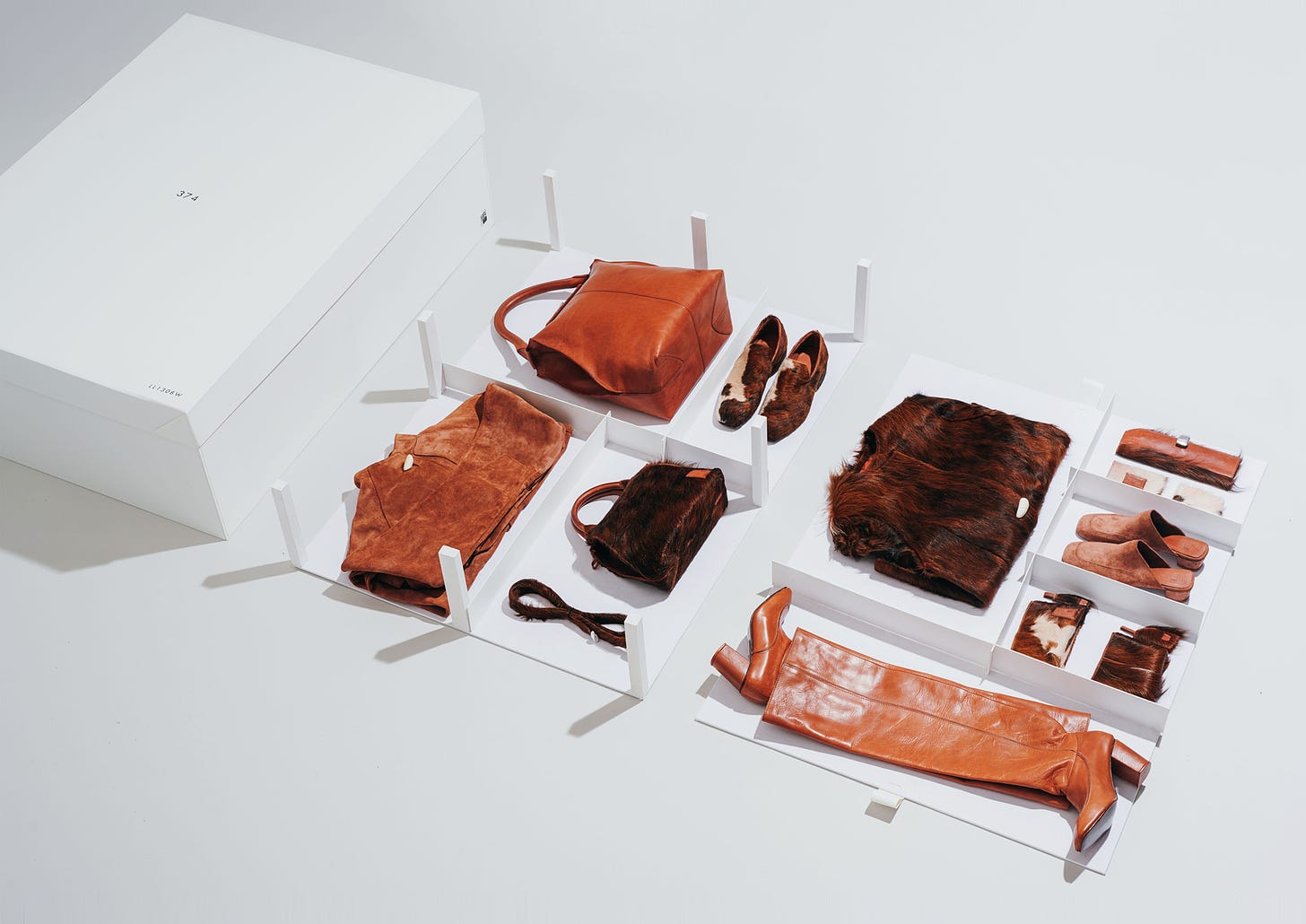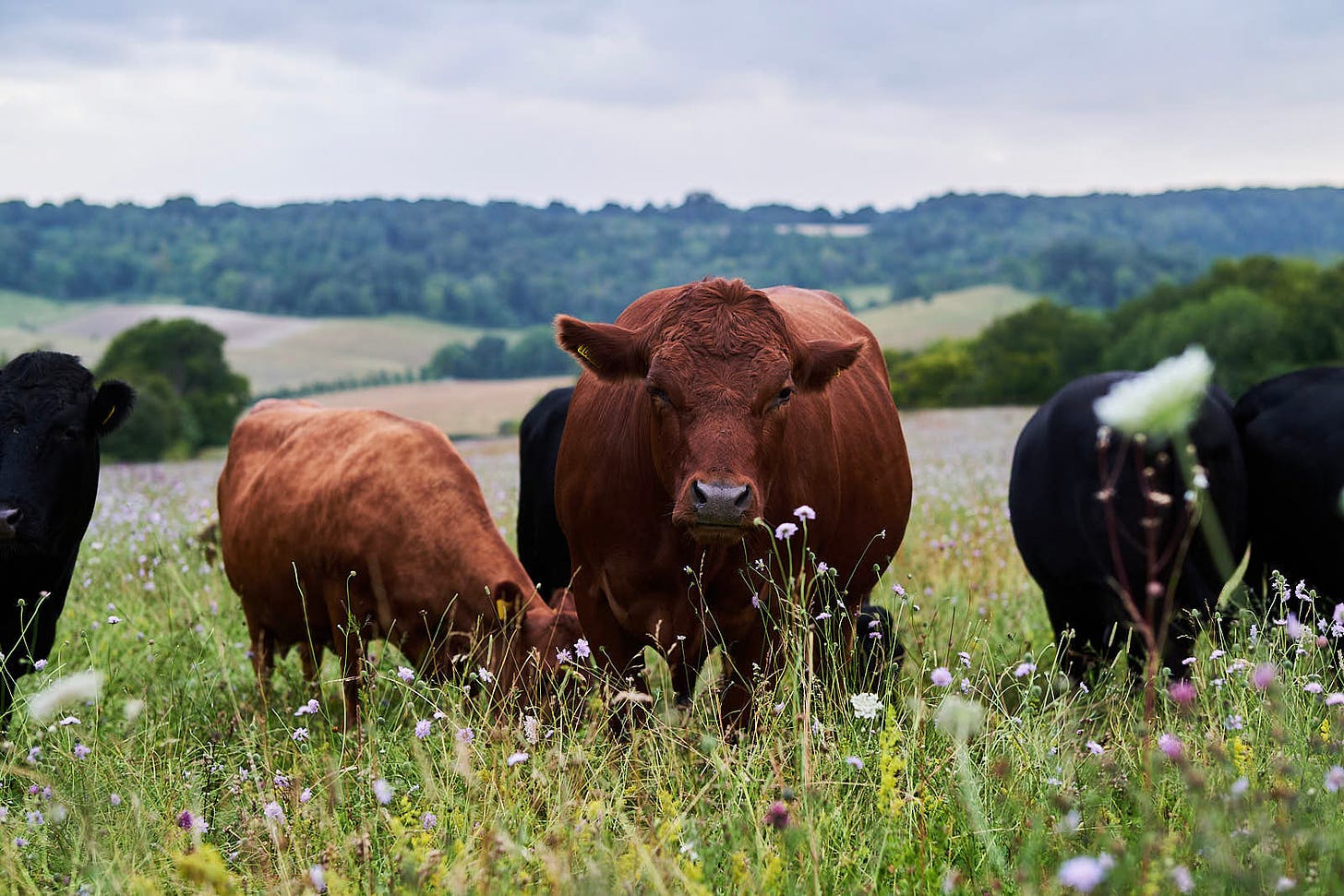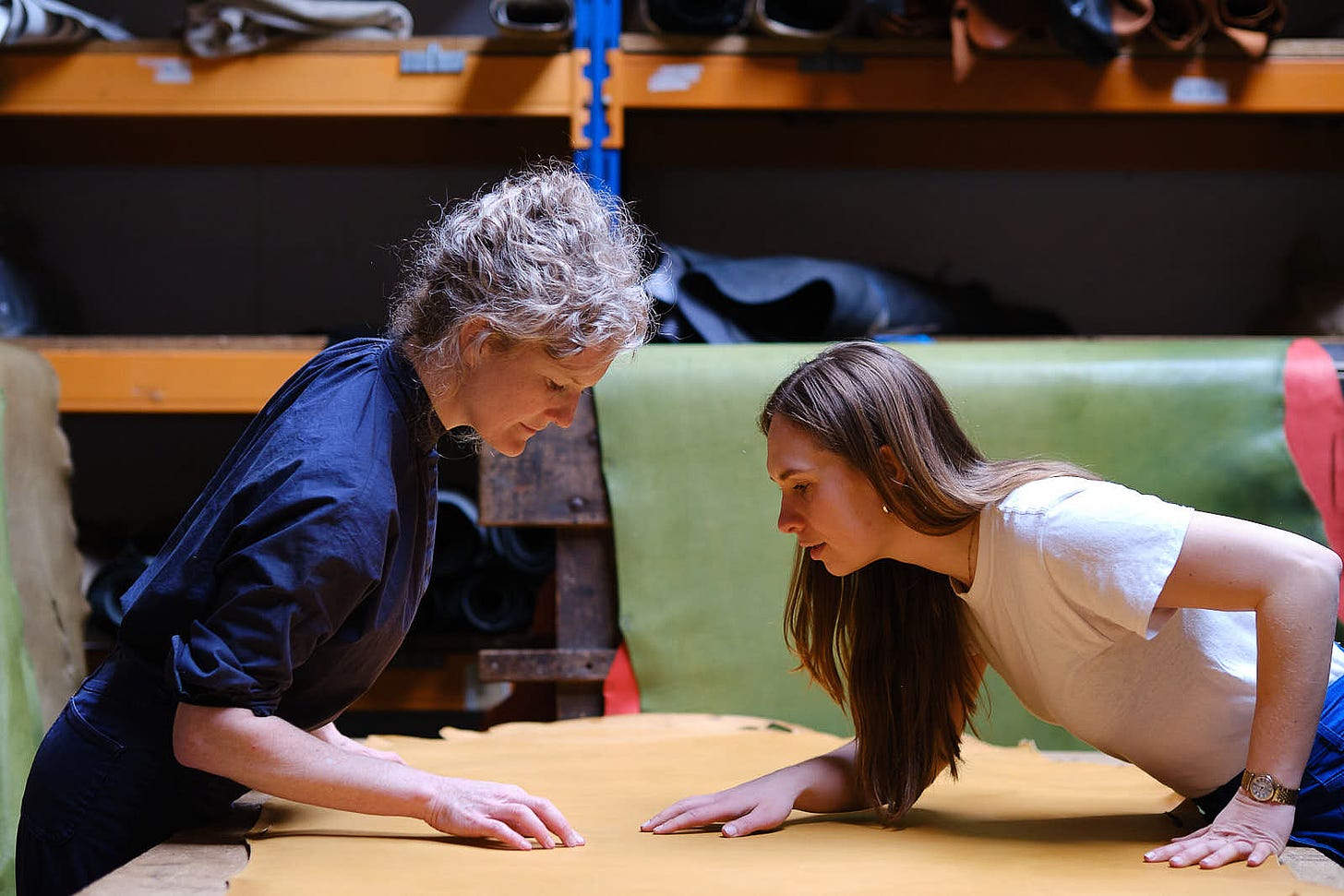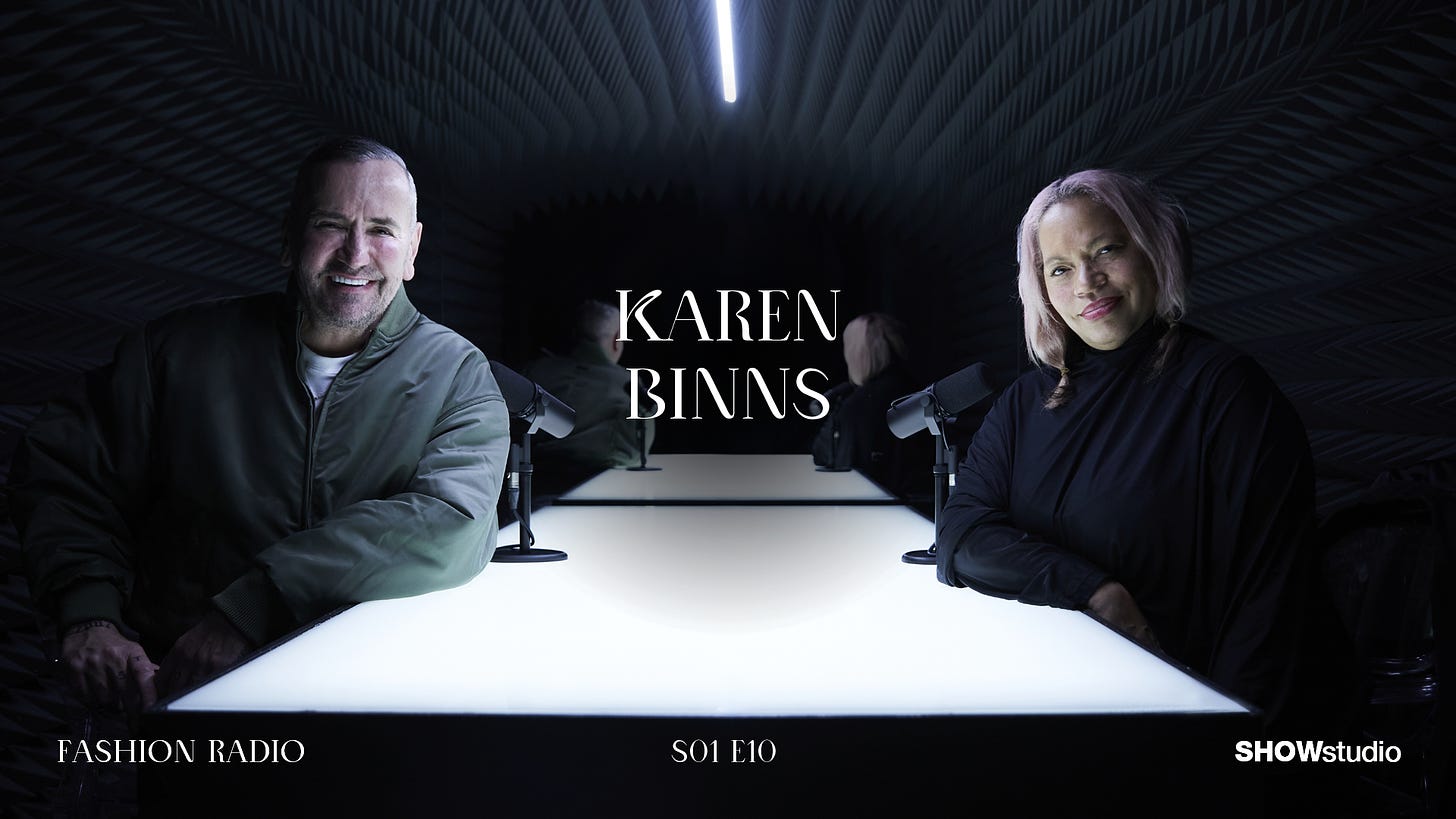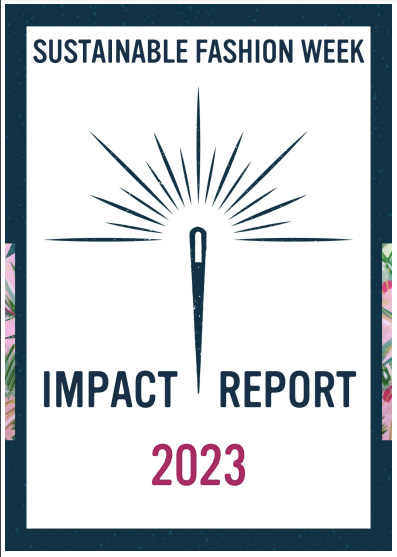Credit: Joshua Fray. Image shows Alice’s Collection 374 made from Longhorn Limousin Cross hide and showcased against a white backdrop.
Alice V Robinson is a designer based in London and is the co-founder of British Pasture Leather.
Her journey began through the process of making a handbag, whilst studying her MA in Accessory Design at the Royal College of Art.
On realising the lack of connection between agriculture and fashion and the convoluted supply chain she was faced with, Alice embarked on a journey of extraordinary lengths to make a connection and discover the provenance story of British leather.
Provenance is often ubiquitous with food, but doesn’t always connect with fibre in the same way. In writing her book ‘Field Fork Fashion’ Alice purposefully makes this connection, whilst working at a smaller scale with regenerative farming practices.
Through this interview, Meg Pirie and Alice discovered many thematic similarities between Fashion Roundtable’s work on regenerating British wool and Alice’s discoveries while working with leather as a medium.
Q. Congratulations on your book. Initially you were a student at the RCA and then you discovered a complex supply chain, lacking in transparency -– is that right? Is this how the book evolved?
A. Thank you! Yes, it was when I was studying accessory design MA that I became determined to learn more about the leather I was using. I found that the questions I had about the material were largely unanswerable; what animal, farm, place and community had it originated from. I believed that finding this information could inform and give agency to my design choices. Working backwards through the supply chain was impossible for me, so I decided to start from where I’d grown up in Shropshire. In the book I share how my research led me to buying a sheep and working with only the fibres it produced, creating Collection 11458. After graduating I wanted to continue this line of enquiry and met a local farmer rearing native breed Longhorn cattle. This was around the same time the Victoria and Albert Museum had asked me to show my work at their upcoming exhibit FOOD: Bigger than the Plate. The stars aligned. My research developed to look at how the disconnection between leather and agriculture occurs, and what it would look like to respond to the farming systems I was surrounded by.
Q. My work on wool has been similar so I completely get this. For me it’s about connecting breed to end use – so a Blue-faced Leicester sheep for a soft knit. How did this play out in your work?
A. Bullock 374 was a Longhorn Limousin cross. English Longhorns are a native hardy breed and Bullock 374’s large thick hide was evidence of this. I documented in the book how both full grain leather and suede were able to be created - learnings that at the time were revelations to me - I approached designing after. I wanted to first see what this leather would be suited to make. My designs were considered with those parameters in mind. From there, lengths of coats, widths of bags and a product range could be decided. The experience was rather liberating, knowing that I only had a certain volume of leather to work from, knowing how precious this resource was made me diligent in making design choices. How the material looked was also out of my hands. Similarly to the expectations we have often have for all wool to be fine and soft, there are commonly held ideals of leather to be blemishless and perfect. The hide was scratched and there were bite marks that had healed over in places. I decided not to shy away from those details, understanding that this was evidence of a life on Charity Farm.
Q. I feel that this idea of provenance must be at the heart of slow fashion. We see this with food all the time, can you explain the importance of this in fashion?
A. For me provenance builds a relationship between producer and citizen, whether the produce is food or fashion. Great attention is given in food to celebrate the uniqueness of native varieties and the benefits of having diversity in what is produced. Nevertheless, uniformity and abundance is often preferenced for commercial reasons. I believe the importance of provenance in fashion is in the ability to create an origin story, one which a designer or owner of an item becomes a part of. Only with that visibility can we question the decisions being made earlier in a supply chain and appreciate the value of the materials we use. Responding in this way may inevitably be slower. In terms of leather I see this as no bad thing, a rhythm of production could then be led and defined by the farming community you’re connected to.
Pasture for Life Farm - British Pasture Leather - Credit Jason Lowe. Image shows native breed Dexter cattle grazing in a wildflower meadow.
Q. Your book discusses regenerative agriculture - which as a standard or framework is being heralded as best-practice, but is also currently ubiquitous with greenwashing. What does regenerative agriculture mean to you?
A. I had never heard the word regenerative when I began the work inside this book in 2017, but it is one I have since come to understand through the experiences I’ve had on farms throughout Britain. After creating collection 374 I embarked on a project with my (now) co-founder Sara Grady, to create British Pasture Leather - a new supply of leather made from the hides of cattle raised on regenerative farms in the UK. We have been working with a community of farmers which “champion the restorative power of grazing animals on pasture”, advocating for cattle (and other animals) be raised on a diverse natural diet 100% of the time. It is my understanding that for grazing animals to support the regeneration of land and ecosystems they must be playing a part in the carbon cycle - grazing, trampling and leaving grass to rest whilst feeding the soil with organic matter. To me regenerative agriculture is this practice of mirroring nature's processes to produce nutritious food and biodiverse resilient landscapes.
Q. What are the challenges and opportunities of working at a smaller scale?
A. One of the benefits of working at a smaller scale is certainly creating personal relationships, whether that be at the farm level or processing, these have been vital for us when proposing new ideas for British Pasture Leather. Many of the abattoirs we’ve spoken to have been small-scale and they’ve been receptive to us asking to try something different, but when we’re talking about leather, a material collected, traded and produced in vast volumes, challenges arise around manufacturing and cost.
Co-founders of British Pasture Leather Sara Grady and Alice V Robinson - Credit Jason Lowe. Image shows co-founders looking at the material together in a studio setting.
Q. You showcased your work at the V&A. What was the reaction and how did it feel?
A. Originally it was my MA work, collection 11458 which was requested to be shown and I am incredibly grateful, still, to the brilliant curators for taking a punt on me and Collection 374. The V&A both shared and supported my vision of creating experiences that connected food and fashion. Nearing the end of the exhibition we hosted 65 people for a three course dinner which included the final cuts of meat from Bullock 374, cooked exquisitely by renowned chef Sally Abe. Being a part of this exhibit certainly cemented my belief that storytelling and sensory experiences are key for creating a dialogue around the challenges we face in fashion and in our food systems. It was a privilege to have been a part of FOOD: Bigger than the Plate, I was honoured to have been asked.
Q. What’s next?
A. We have an exciting year ahead with British Pasture Leather. The first items made with this material will be available via some exciting collaborations in 2024 - keep an eye out!
'Field, Fork, Fashion : Bullock 374 and a designer's journey to find a future for leather' – Published by Chelsea Green can be purchased below.
“I believe the importance of provenance in fashion is in the ability to create an origin story, one which a designer or owner of an item becomes a part of. Only with that visibility can we question the decisions being made earlier in a supply chain and appreciate the value of the materials we use.”
Karen Binns our Fashion Director on SHOWstudio Fashion Radio
Image credit: Design & Concept: Carla Theurer | Video Edit: Kit Whalley-Payne | Film Camera: Christoph Langenberg | Host: Fat Tony. Image shows Fat Tony interviewing Karen Binns each with a microphone in a studio setting: S01 E10 SHOWstudio.
For S1 Episode 10 of SHOWstudio Fashion Radio, our Fashion Director Karen Binns, reveals the tracks she has kept going back to throughout her fantastically stylish career which has seen her work with musicians and designers alike, styling Tori Amos’ most revolutionary looks and world tours for Whizkid.
Not to be missed!
Sustainable Fashion Week share their impact for 2023
Image shows the cover of Sustainable Fashion Impact Report for 2023. The colours are teal and pink and there is an image of a sewing needle with a sunburst coming out of the top.
Sustainable Fashion Week is founded by Amelia Twine, who co-chairs our Sustainability and Social Justice Committee.
Their key purpose is to drive change at a grassroots level, through – running clothes swaps and repair cafes; as well as speaking at schools; advocating for entrepreneurs and reinvigorating the high street through micro fashion businesses.
Every September they hold ‘Sustainable Fashion Week’ with an output of Community Programme fringe events building on from this.
Their latest Impact Report for 2023 is now live and focuses on some fantastic achievements and learnings.
COP 28 Debrief: What’s next for the private sector?

The Conference of the Parties (COP) to the UN Framework Convention on Climate Change (UNFCCC) is an international climate summit where the world leaders gather to work together on solutions to tackle climate change.
COP28 will take place from 30 November to 12 December 2023 in Dubai which will be a key moment for the world to unite around tangible climate action and deliver realistic solutions.
Join this interactive live session on the 18th December at 9:30 a.m. EST hosted by the UN Global Compact Academy as a debrief after the U.N. Climate Change Conference (COP28).
In this live debrief session, you’ll hear from senior advisers from across the UN Secretary-General’s Climate Action team who will provide context and nuance to the main headlines from COP28 and share priorities for corporate action to drive progress in 2024.
Fashion District launch an experiential, business support programme called Evo Fashion
Fashion District have just launched a five-month experiential, business support programme called Evo Fashion, especially developed for emerging designers, brands and fashion technology businesses.
Evo Fashion summary:
A five-month experiential programme for emerging brands and fashion technology businesses
It will take a holistic approach to business strategy, focusing on supply chain sustainability, ethical working standards, channels to market, and investment readiness
Delivered by experts and held over five IRL masterclasses
Supported with expert 1-2-1s and online peer-to-peer sessions
Expert coaches and guest speakers include;
Sustainability champion and luxury expert Vanessa Podmore, Founder, Podmore Consultancy
People coach and Evo Learning’s coach-in-residence Tom Farrand, Founder, Human Energy Co
Applications are now open. Please click below for more.





